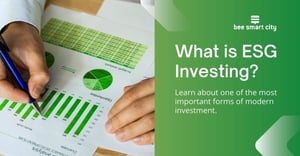Socially responsible investments are becoming more and more popular. ESG investing is arguably one of the most important forms of modern investment. ESG investors are forward-thinking investors who carefully consider a company’s impact and influence over environmental issues, social cohesion, and governance strategies, as well as financial returns. Of course, financial dividends are also important to ESG investors, however, an ESG investor is more concerned about the long-term sustainability of a company rather than short-sighted financial returns.
Assessing the strength of a company using non-financial metrics isn’t a brand-new phenomenon. However, there has been a growing interest in ESG in recent years as the market has evolved to favour companies with long-term growth strategies and executable sustainability goals. Climate change, carbon footprints, the Covid-19 pandemic, business ethics, and other factors have helped accelerate new investment philosophies for a new generation of investors that favour more than simple financial returns. ESG metrics may not be rooted in financial returns, but a commitment to long-term goals helps investors evaluate potential material risks and assess the possibility of future growth opportunities, resulting in financial gains.
The problem with ESG investing is that it’s hard to know how sustainable a company or opportunity truly is. What’s more, there are many ways to measure ESG, but there is no standardisation. Companies can invite third-party companies to perform evaluations, either through a combination of surveys and site visits, or they can create a tailored analysis based on their own evaluations. Some research houses delve deeper into specific aspects of ESG, while others prefer to take a broader view. Whether you’re looking at ESG ratings or ESG benchmarking scores, both will provide a detailed overview of the company’s ESG risks, opportunities, and potential value.
Who is an ESG investor?
An ESG investor is someone who recognises the correlation between social, environmental, and economic issues. These three issues greatly depend on each other, and what affects one will significantly affect the other. In short, ESG investors are those who are looking to invest in resilient, future-proof companies and portfolios that can weather any storm and significantly add social value to the global community.
In recent years, ESG investing has come under the spotlight. However, ever since 2020 and the subsequent COVID-19 pandemic it has become one of the most interesting and talked about investing philosophies. This is largely down to the market disruption and the uncertainty that followed, but it also changed the mindset of many investors and highlighted the importance of resiliency.
During the first months of 2020, more than $45.6 billion USD was invested into ESG funds. Currently, approximately $30.7 trillion USD is sitting in sustainable investment funds—a figure that’s expected to rise to more than $50 trillion USD within the next twenty years. It’s clear that many investors are looking to support companies with a strong interest in sustainability, climate protection, social equity, and business harmony. As interest in ESG continues to grow, financial returns are growing with it.
In fact, portfolios that actively support ESG are frequently outperforming those that don’t incorporate ESG factors into their long-term strategies. Interestingly, a study from Morningstar discovered that 77% of ESG funds that existed over a decade ago are still in operation today, compared with 46% of traditional investment funds.
It’s easy to attribute the renewed interest in ESG investing to the global pandemic and subsequent supply chain issues and other related factors, but there’s more to it than circumstance. In fact, the investment demographic is rapidly evolving to become more inclusive. More women and young people are entering the investment market, challenging previous investing norms and bringing diversity to the landscape. For example, this new demographic has different values to traditional investing groups, with a strong focus on climate change protection, social inclusion, sustainability, and other socially responsible investments that focus on the common good.
What does an ESG investor look for?
ESG shareholders invest in a particular company or portfolio for any number of reasons. Some invest because of the above-mentioned proof that companies with a strong interest in ESG produce better financial returns in the long term. Others invest because they truly believe in the ideals of a company and how it treats its customers, employees, communities, shareholders, and the surrounding environment.
However, one over-arching theme that most shareholders and investors generally agree on is one simple and often undervalued trait: strong leadership. A company with a clear focus on ESG pillars, that embraces both its corporate and social responsibility, and that’s determined to reduce its carbon footprint and become carbon neutral, is often led by trustworthy and forward-thinking leaders. This is very attractive to investors.
In short, a good ESG score is a good measure of a company’s integrity, which improves its value, and boosts its impact. In that regard, ESG is a practical measuring stick that can be used to identify a company’s strength, sustainability, and overall trustworthiness.
Environmental Social Governance: Examples
Aside from a company’s overall integrity, potential ESG investors should also look out for several key issues within ESG’s main pillars.
Broadly speaking, ESG investors look for companies that address the following concerns in the three ESG pillars: Environment, Social, and Governance. Here is a selection of key issues that ESG investors should pay particular attention to.
Environmental
- Forward-thinking climate change policies
- Plans to reduce greenhouse gas emissions
- Strategies to reduce carbon footprints
- Water conservation projects
- The transition to renewable energy
- Practical recycling practices
- Eco-friendly and green infrastructure
- Incentives for employees to go green
- Full compliance with environmental regulations
Social
- Support for worker’s rights
- Dedication to employee satisfaction. This includes pensions, benefits, training, and harassment prevention
- Diversity in the workplace
- Pay increases and promotions
- A strong focus on customer service
- Consumer protection
- Ethical sourcing: sustainable products from local providers
- A noble mission statement
- Commitment to local charities and concerns
- Championing social justice issues
Governance
- A cap on executive pay and bonuses
- Transparent and ethical business practices
- A diverse and inclusive management structure
- Democratic values
- Transparent communications
- No opportunity for potential conflicts of interest
- Ethical business practices
- A strong commitment to ESG values, and not simple “greenwashing” or “social washing”
- Full compliance with all laws, both local and international
Naturally, this list is just a snapshot of the many issues that concern ESG. For more information, please refer to our separate articles on Environmental, Social, and Governance.
ESG: Risk Vs. Reward
Any kind of investment requires due diligence on the part of the investor. ESG investment is no different. Unlike many other aspects of financial reporting, it’s not compulsory for companies to disclose their ESG scoring—if they have them at all. Because of this, prospective investors must take the time to fully scrutinize a company or portfolio before getting involved.
Unfortunately, the current ESG trend has led to the deliberate misrepresentation of facts and figures in certain verticals. You may have heard of the term greenwashing, which is when a company or institution misrepresents their eco-friendliness or distracts the public from the truth with minor green strategies to blind them from the truth. Social washing is also a sad fact of life. This is the practice of companies exaggerating their commitment to employee rights and community projects for the sake of their reputation rather than the common good.
A savvy investor must be able to judge the difference between legitimate ESG efforts and unsustainable vanity projects. Fortunately, the rise of ESG reporting and ESG benchmarking tools is helping to make greenwashing and social washing a thing of the past. Given that sustainability is at the heart of ESG, when it comes to investment, the rewards far outweigh the risks.
Any company with a serious dedication to ESG principles will be looking for long-term growth rather than brief, short-term gains. Sustainability is the core of ESG, and companies and portfolios hoping to attract ESG investors will allocate capital for long-term gain, invest in their business to avoid employee dissatisfaction, will optimize their portfolio to prevent stranded assets of premature write-downs, and will attract top talent to their cause because of their commitment to forward-thinking strategies and goals.
The benefits of ESG compliance far outweigh the risks, and that principle rings true to both company executives and potential investors.
Get our Executive Summary on ESG in Real Estate!
In this Executive Summary on ESG in Real Estate, we lay out the essentials that Real Estate decision-makers should know to get from ESG compliance to leveraging ESG as a value driver for real estate portfolios.


